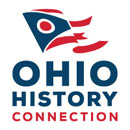
About
The National Digital Newspaper Program in Ohio (NDNP-OH) is part of the National Digital Newspaper Program, a competitive grant program funded by the National Endowment for the Humanities and managed by the Library of Congress. Through this long-term effort to preserve and provide increased access to America’s historic newspapers, Chronicling America hosts over 21 million pages of freely-available, full-text searchable historic newspapers covering 1756-1963 from 50 U.S. states and 3 territories.
Since 2008, the Ohio History Connection has digitized over 520,000 pages for Chronicling America. This collection covers 1834-1963 and includes about 176 titles (103 title families) from 64 counties around the state. Papers reflect perspectives of Democratic, Whig, Republican, and Know-Nothing political parties, as well as African American, immigrant, urban, rural, abolitionist, temperance, communist, religious, and labor communities. By the end of 2025, we will add 100,000 more pages to the website.
Visit Newspapers to see a full list of our digitized newspapers (on both Chronicling America and Ohio Memory) and direct links to browse and search this content!
Advisory Board
The National Digital Newspaper Program in Ohio relies on its advisory board for the selection of papers as well as for its members’ expertise in a variety of areas. The board is currently comprised of seven members with knowledge and expertise in digitization, as well as Ohio history and communities.
Current Members
- Janet Carleton, Ohio University (2008-current)
- Dr. John Grabowski, Case Western Reserve University/Western Reserve Historical Society (2016-current)
- Holly Kirkendall, Wood County Museum (2023-current)
- Carla Mello, Ohio History Connection (2023-current)
- Dr. Doreen Uhas-Sauer, Columbus Landmarks Foundation (2016-current)
- Adam Wanter, MidPointe Library System (2023-current)
- Dr. Jewon Woo, Lorain County Community College (2023-current)
Former Members
- Susan Allen, Worthington Public Library (2008-2015)
- Bill Barrow, Cleveland State University (2008-2010)
- Brian Brennan, Youngstown State University (2010-2015)
- Jim Buchman, State Library of Ohio (2008-2011)
- John Burnham, Ohio State University (2008-2012)
- Steve Charter, Bowling Green State University (2008-2015)
- Jill Clever, Toledo Lucas County Public Library (2016-2020)
- Frank Deaner, Ohio Newspaper Association (2008-2015)
- Cynthia DuChane, INFOhio (2009-2011)
- Greg Edwards, Public Library of Cincinnati & Hamilton County (2008-2015)
- Kathy Fernandez, North Canton Heritage Society (2008-2010)
- Jim Gibson, Knox County Historical Society Museum (2010-2015)
- John Haas, Ohio History Connection (2010-2015)
- Stuart Hobbs, Ohio State University (2011-2012)
- Tutti Jackson, Ohio History Connection (2011-2015)
- Kimberly Kenney, McKinley Presidential Library & Museum (2010-2015)
- Shannon Kupfer-Trausch, State Library of Ohio (2011-2015)
- Bill Lawson, Mahoning Valley Historical Society (2008-2010)
- Virginia Moore, Ohio Resource Center & Ohio Department of Education (2010-2014)
- Tom Neel, Ohio Genealogical Society (2008-2015)
- Suzanne Reller, University of Cincinnati (2016-2020)
- Tom Rieder, Ohio History Connection (2016-2020)
- Laura Sponhour, INFOhio (2011-2015)
- Ernest Thode, Washington County Public Library (2008-2015)
- John Vacha, Western Reserve Historical Society (2010-2015)
- Jane Wildermuth, Wright State University (2008-2015)
Selection Lists
Each grant cycle’s selection list was guided by specific themes outlined in the grant proposal. The advisory board’s recommendations ensured an equitable coverage of subject matter, geography and chronology within the list of available titles.
2023-2025
2023-2025 Selection List (Coming Soon!)
Content covering 1812-1963 highlights Ohio’s transportation infrastructure, history of community building, and democracy in its most transformative time periods (pre-1835 and 1920-1963), amplifying stories already told on Chronicling America while exposing untold and lesser-known histories. From the impact of westward expansion and European settlement on the land we now call Ohio to the ways Ohioans caused and coped with change resulting from significant national and world events and movements, Ohio’s history is both representative and instrumental to understanding that of the entire United States.
2018-2020
2018-2020 Selection List
Content covering 1920-1960 highlights Ohio’s history during the significant events and cultural changes of the Prohibition Era, Roaring Twenties, the Great Depression, World War II, and the post-war population boom, and included labor and African American newspapers.
2016-2018
2016-2018 Selection List
Content covering 1836-1963 highlights Ohio’s vibrant, influential and industrious immigrant communities in both urban and rural areas (German, Hungarian German, Croatian, Czech, Hungarian, Lithuanian, Polish, Romanian, Slovak and Slovenian).
2012-2014
2012-2014 Selection List
Content covering 1836-1860 highlights the early growth in Ohio’s population and businesses, as well as the impact of political, financial and social upheaval, such as implementation of the Indian Removal Act, the Panic of 1837, and the growing anti-slavery movement.
2010-2012
2010-2012 Selection List
Content covering 1850-1880 highlights Ohio’s role before, during, and after the Civil War—Ohio was a strong abolitionist stronghold; contributed over 320,000 soldiers and over 130 generals to the Union Army; and sent three men to the White House in the two decades following the war (Ulysses S. Grant, Rutherford B. Hayes, and James A. Garfield).
2008-2010
2008-2010 Selection List
Content covering 1880-1920 highlights Ohio’s transition from a primarily rural and agricultural state to one that was more urban and industrial. Ohio served as an epicenter of American transportation, manufacturing, commerce, and politics—it was home to major coal and steel industries, and sent four men to the White House between 1888 and 1920 (Benjamin Harrison, William McKinley, William Howard Taft, and Warren G. Harding).
More Resources
K-12 Resources
Visit For Teachers to access classroom activities and lesson plans which feature Ohio’s newspaper content and align with Ohio’s state learning standards.
Video Tutorials
Using Chronicling America Podcasts
Retired in 2024 due to new Chronicling America platform
Chronicling America Search Strategy Videos
Some content may be outdated due to new Chronicling America platform
Searching Chronicling America’s Foreign Language Newspapers
| Title | Description | Transcript |
| Researching with Foreign Language Newspapers | Watch this video to learn some tips for working with foreign language newspapers on Chronicling America. Topics covered include the importance of immigrant newspapers; titles and mottos; bias; appearance; and contents. You may also find this video helpful if you’re working with other historic newspapers. | View Transcript |
| Using Online Translation Tools | Watch this video to learn some tips for working with online translation tools in order to access the information contained in foreign-language newspapers on Chronicling America. You may also find this video helpful if you’re working with other foreign-language printed materials. | View Transcript |
| Working with German Fraktur | Watch this video to learn some tips for working with Fraktur font in order to access the information contained in German-language newspapers on Chronicling America. You may also find this video helpful if you’re working with other German-language printed materials that use a Fraktur font. | View Transcript
|
Non-NDNP Newspaper Archive Survey
NDNP awardees are responsible for locating other freely available digital newspaper resources for their state and compiling information about these resources into on a Library of Congress-developed spreadsheet. For each title located, the publisher location, dates of publication, LCCNs, site owner/producer, URL, dates of digital edition and number of issues available and other information are provided.
Disclaimer: This webpage serves to document the National Digital Newspaper Program in Ohio and its activities. Any views, findings, conclusions or recommendations expressed on this website do not necessarily represent those of the National Endowment for the Humanities or Library of Congress. If you have questions or comments, please contact our staff.



